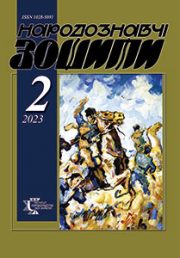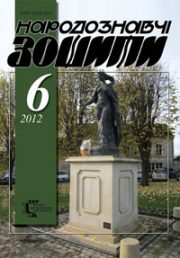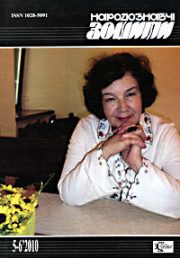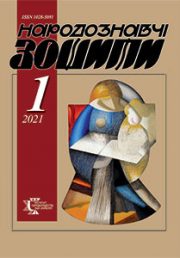The Ethnology Notebooks. 2019, № 5 (149), 1286—1290
UDK 811.161.2’243:37.02
DOI https://doi.org/10.15407/nz2019.05.1286
EMPATHY IN THE LINGUO-DIDACTIC ASPECT
TRUMKO Oksana
ORCID ID: http://orcid.org/0000-0003-3816-6164
Сandidate of Philological Sciences
Research Associate of International Institute of Education,
Culture and Relations with the Diaspora
Lviv Polytechnic National University
32А, Stepan Bandera Str., 79013, Lviv, Ukraine
e-mail: oksana_trumko@ukr.net
Abstract. The use of a communicative approach in teaching Ukrainian as a foreign language necessitates studying the peculiarities of the implementation of various communicative intentions in Ukrainian language. The purpose of this article is to clarify the issue of teaching empathy in a foreign language audience, particularly it addresses the communicative prerequisites for the realization, lexical and grammatical devices of expressing apology, comfort, compliment and sympathy — communicative intentions aimed at improving the interlocutor’s psychological and emotional state. The following research methods were used to achieve the goal: descriptive, comparative, lexical-semantic methods and contextual analysis.
Results. It has been established that the expression of the communicative intention of apology occurs when the speaker has worsened the addressee’s psychoemotional state. The expressions of comfort and sympathy are intended to improve the addressee’s psychoemotional state formed by external factors. The compliment aims to please a recipient.
To express empathy, at the lexical level speakers use evaluative, emotional, and abstract vocabulary, proverbs and sayings, persistent phrases, endearing addresses, adverbs, exclamations, and particles. At the syntactic level, the content of communicative intentions is filled by performatives and imperatives, simple / common simple, one-member and complex sentences, interrogative and rhetorical sentences, inversions.
Conclusions. Thus, foreigners, learning Ukrainian as a foreign language at the level of B2, should learn specific features of the realization of empathy in the Ukrainian language at both pragmatic and linguistic levels, which provide adequate linguistic and behavioral response in the Ukrainian-speaking linguocultural space.
Keywords: methodology of teaching Ukrainian as a foreign language, empathy, apology, comfort, compliment, sympathy, communicative intention, linguistic devices.
Received 10.10.2019
REFERENCES
Shvets, H. (2016). Speech genre of a joke in the linguodidactic aspect. Teaching of languages in higher education at the present stage.Cross-subject links: research, experience, exploration (Issue 28, pp. 144—153) [in Ukrainіan].
Raikhshtein, A. (1988). Comparative Study of English and Russian Phraseology. Moskva: Prosveshchenye [in Russian].
Schwartz, W. (2002). From Passivity to Competence: A Conceptualization of Knowledge, Skill, Tolerance, and Empathy. Psychiatry (Vol. 65 (4), pp. 338—345).
Kuznetsova, A. (2010). Illocutionary types of verbal empathy. The thesis for the academic degree of Candidate of Philological Sciences with a specialization in The theory of language. Ufa [in Russian].
Tatsenko, N. (2015). Еmpathy as a category of linguistic pragmatics. Bulletin of Zaporizhzhya National University. Philological Sciences, 2, 282—288 [in Ukrainіan].
Tatsenko, N. (2015). Еmpathy category in the light of linguistic emotiology. The Philological Treatises, 1 (Vol. 7. pp. 50—60) [in Ukrainіan].
Vyhovska, L. (1999). Empathy as the device of realization of subjectival pedagogical paradigm. Рsychology (Issue 4 (7), pp. 61—66) [in Ukrainіan].
Reik, T. (1983). Listening with the third ear: The inner experience of the psychoanalyst. New York: Grove.
Bally, Sh. (1961). French stylistics. Moskva: Yzd-vo іnostr. lyt. [in Russian].
Selivanova, O. (2006). Modern Linguistics: Terminological Encyclopedia. Poltava: Dozvillia-K. [in Ukrainіan].
Turanskyi, І. (1990). Semantic Category of Intensity in the English Language. Moskva: Vуsshaia shkola [in Russian].
Shakhovskyi, V. (2008). Categorization of emotions in the lexico-semantic system of language. Moskva: LKI [in Russian].
Adamchuk, T. (1996). Thematization of emotions in the text (based on modern English). The thesis for the academic degree of Candidate of Philological Sciences with a specialization in Germany language. Saransk [in Russian].
Ortony, A. (1995). The cognitive structure of emotions. In V. Petrov (Ed.). Language and intelligence (рр. 314—384). Moskva: Prohress [in Russian].
Dedukhno, A. (2011). Communicative-pragmatic and structural-semantic characteristics of performative act of apology. Scientific notes (Vinnytsia State Pedagogical University named after Mikhail Kotsyubynsky). Series: Philological Sciences (Linguistics) (Issue 14—15, pp. 130—134) [in Ukrainіan].
Iurchyshyn, T. (2015). Expressing generalized content as expressives. Scientific Notes of Ostroh Academy National University: Philology Series (Issue 53, pp. 277—279) [in Ukrainіan].
Batsevych, F.S. (2006). An introduction to Linguistic Genealogy. Kyiv: Akademia [in Ukrainіan].
Shabat-Savka, S. (2015). Functional content range and means of verbalization of suggestive prompting. Messenger of Kyiv National Linguistic University. Series Philology, 2 (Vol. 8, pp. 203—210) [in Ukrainіan].
Trofymova, N. (2008). The Speech Act of Compliments: рragmatic analysis. Noneconomic Post Scriptum (Pp. 80—88) [in Russian].
Kuzenna, N. (2010). The Speech Acts of Compliments in modern communication. Scientific notes of the Volodymyr Vynnychenko Kirovohrad State Pedagogical University. Series: Philological Sciences (Issue 89 (2), pp. 21—26) [in Ukrainіan].
Koziarevych, L. (2006). Verbal and non-verbal means of empatization of dialogical discourse (based on English prose of XX century). The thesis for the academic degree of Candidate of Philological Sciences with a specialization in Germany languages. Kyiv [in Ukrainіan].
Ozarko, I. (2009). Lexical and grammatical verbalization of the pity in modern Ukrainian. Current problems of Slavic Philology. Series: Linguistics and Literary studies (Issue XXI, pp. 620—626) [in Ukrainіan].







